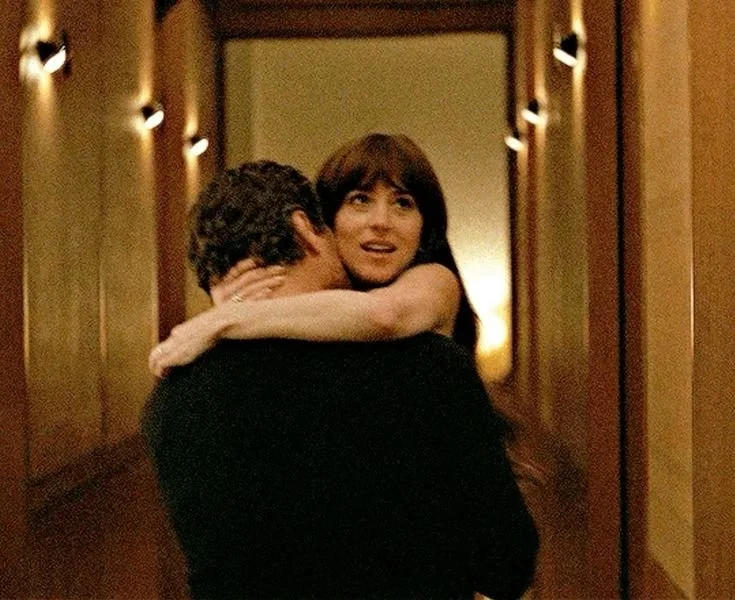In Defence of RomComs
Still from Materialists (2025)
I’ve been bemoaning the death of the romantic comedy for some time now. The genre persists, albeit in forms that pale in comparison to the classics — Notting Hill (1999), Bridget Jones's Diary (2001), You’ve Got Mail (1998), 10 Things I Hate About You (1999). Many, including myself, routinely rewatch them. Their blatantly predictable formulas are an innate comfort — the kind that sees you through tween sleepovers, breakups, and hungover mornings.
But genuine romantic comedies have all but vanished. In 2009, seven of the 50 highest-grossing films in North America were rom-coms. In 2025, Celine Song’s Materialists is the top contender. Yet despite its rom-com label, it barely meets the criteria. The protagonist, Lucy (Dakota Johnson), is a thirty-something matchmaker who offers relief to New Yorkers tired of swiping and liking. The film suggests that love is a strategic, material affair, devoid of spontaneity. The film, and Lucy herself, don’t believe in love.
Materialists offers a sexy, sleek love triangle, which takes flight during a wedding after party, yet plummets during the second act. The two men, Harry (Pedro Pascal) and John (Chris Evans), are both experiencing a crisis of masculinity. John fits the starving artist archetype, pushing forty and still in search of purpose. John, typically an appealing, mischievous screen presence, is relegated to the sidelines. Harry has magnetic charisma and plays the provider. Their courtship unfolds as a parade of bouquets and sushi dinners, devoid of organic connection, and quickly sours. Two modern paradigms of masculinity, the artsy indie boy and the handsome finance bro, are called into question. The outcome is that neither is a viable option. So why bother dating?
Its pessimistic parable, that modern dating is superficial (duh!), defies characterisation. Let me explain. Unlike Kathleen’s enduring frazzle, Lucy appears perpetually aloof and unreadable. Her attire and ponytail are sleek, often paired with a cigarette in hand. In You’ve Got Mail, Kathleen (Meg Ryan) is swaddled in a big coat, waxing lyrical about autumn to her anonymous pen pal (Tom Hanks) while her boyfriend is in the other room — a far cry from Lucy’s shallow disposition. In short, classic rom-coms offered nuanced, lovable protagonists, while Materialists presents one-dimensional fatalism.
The focus on making ‘realistic’ rom-coms, such as Materialists, kills the romance. That may simply reflect dating nowadays, which tends to be less earnest and vulnerable. This is ironic given that when times get tough, audiences have an appetite for escapism.
I miss ridiculous scenes of mundanity. Watching Materialists, I wanted to cringe at Lucy singing along to a Madonna track in her cluttered apartment or sipping morning coffee in striped pyjamas. Scenes of the everyday conjure relatability, a key tenet of the romcom protagonist. Instead, in Materialists, we get a singular scene of Lucy applying makeup in her glossy apartment.
I miss Bridget Jones’s cackle of foul-mouthed friends and her big knits, bouncing from bad decisions to bunny outfits and karaoke sessions. She’s all heart and often no trousers. Her messy love triangle is nonsensical yet enduring.
Comparatively, the lacklustre love triangle of Materialists reflects the changing social circumstances of women, and, by extension, dating. The screwball comedies of the 1940s gave us the brazen Katharine Hepburn, who asserted wit within the paradigms of masculine autonomy. The “chick flicks” of the ’80s and ’90s mediated professionalism with romantic liberty. The political, domestic, and economic position of women has shifted over the past century in tandem with cinema. In this context, rom-coms act as a record of female fantasy. So, I wonder, does it go beyond the screen? Is the rom-com crisis actually a crisis of feminine ideals? Historically, heterosexual women wanted traditional men. Has that changed?
Scott Meslow’s From Hollywood With Love: The Rise and Fall (and Rise Again) of the Romantic Comedy (2022) offers the theory that studio disinvestment in mid-budget films has extinguished the genre. Moreover, the problems that rom-coms deal with, by virtue of their characters being white and middle class, are essentially nonproblems. On the other hand, you could interpret the genre’s decline as social progress. Don’t women have better things to do than chase men? Shouldn’t we be in space, running countries, or spin kicking goons over casino balconies? I don’t have a rebuttal. These objections are, for the most part, valid. And yet, here I am, in a state of panic. Who are we without these movies?
Romantic comedy is the only genre committed to letting ordinary people — no spaceships, no swords — forge meaningful relationships with one another.
Am I wrong to want more?
Designed by Sophie Wishart



